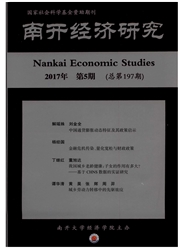

 中文摘要:
中文摘要:
政府财政政策对经济增长和社会福利的影响,是经济增长理论和宏观公共财政理论研究的重点,已经有大量的研究。本文在一个资本积累与创新相互作用的框架下内生化劳动力供给,假设政府通过征收平滑的收入税为公共支出融资,并且将政府公共支出区分为资本性支出和研发性支出,从而考察了税收和财政支出结构对经济增长的影响及其作用机制。研究发现,当政府通过征收收入税为生产性公共支出融资时,收入税税率与经济增长率之间存在一个倒U形的关系,从而回到了Barro(1990)的结论,尽管本文强调的政府财政政策作用于经济增长的机制与Barro(1990)差别较大;在基准经济(benchmark economy)的参数环境下,财政支出结构与经济增长率之间存在一个倒U型关系,从而经济中存在一个最优的财政支出结构。
 英文摘要:
英文摘要:
The impact of fiscal policy on economic growth has been the focus of both the economic growth theory and the macro public finance theory, and there have been a large number of studies which examine whether fiscal policy could make a distinct contribution to economic growth. This paper endogenizes labor supply in an endogenous growth model with capital accumulation and innovation, and we assume that the government imposes flat-rate income taxation to finance for the government expenditure. We try to test the impact of fiscal policy on economy and detect its transmission mechanism. We conclude that there exists an inverted-U relationship between the income tax rate and the growth rate, which coincides with Barro (1990)'s plausible conclusion, though the growth mechanisms are quite different between these two papers. In addition, there exists an inverted-U relationship between the structure of the public expenditure and the growth rate in the benchmark economy. Therefore, we could find the optimal structure of public expenditure in reality.
 同期刊论文项目
同期刊论文项目
 同项目期刊论文
同项目期刊论文
 期刊信息
期刊信息
